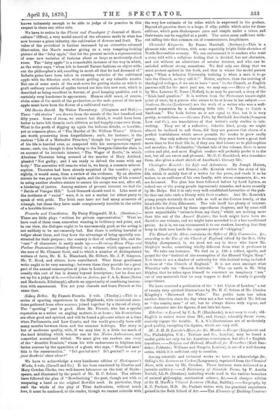Christabel Kingscote. By Emma Marshall. (Seeleys.)—This is a pleasant tale,
well written, with some especially bright little sketches of North-Devonshire scenery. We can recommend it to readers who want a story told with a religious feeling that is decided, but not obtrusive, and not without an admixture of secular interest, and who can be satisfied without strong sensations. We find only one thing that we must protest against in the book, and that is where the model parson says, "What a delusion University training is when a man is to go into the Church, as they call it !" Bettor, anyhow, than the training of theological colleges, if we are to have " men " in the Church, as English parsons still for the most part are, we may say.—Ileirs of the Soil, by Mrs. Lorenzo N. Nunn (Moffat), is, as may be guessed, a story of the "Irish land question.' It is written from the Protestant tenant-right point of view, by a person who seems to be at home in her subject.— Seidman: Stories (Lockwood) are the work of a writer who won a well- earned reputation by a charming little tale, "A Trap to Catch a Sunbeam." The book before us is not equal to that, but it is very pretty, nevertheless.—German Tales, by Berthold Auerbach (Sampaon Low and Co.), are translations of that writer's early studios in tale-
writing. They are of a reflective, didactic kind, prosy, we might almost be inclined to call them, did they not possess that charm of a perfect truthfulness which never permits the reader to grow really weary. One only reflects that in Germany they must have a great deal more time to live their life in, if they can find leisure so to philosophize and moralize. In "Erdtnutha," the last tale of the volume, there is more action and plot, and most English readers will probably prefer it to the rest, but all are sweet and pleasant. Mr. C. C. Shackford, who translates them, also gives a short sketch of Auerbach's literary life.






























 Previous page
Previous page